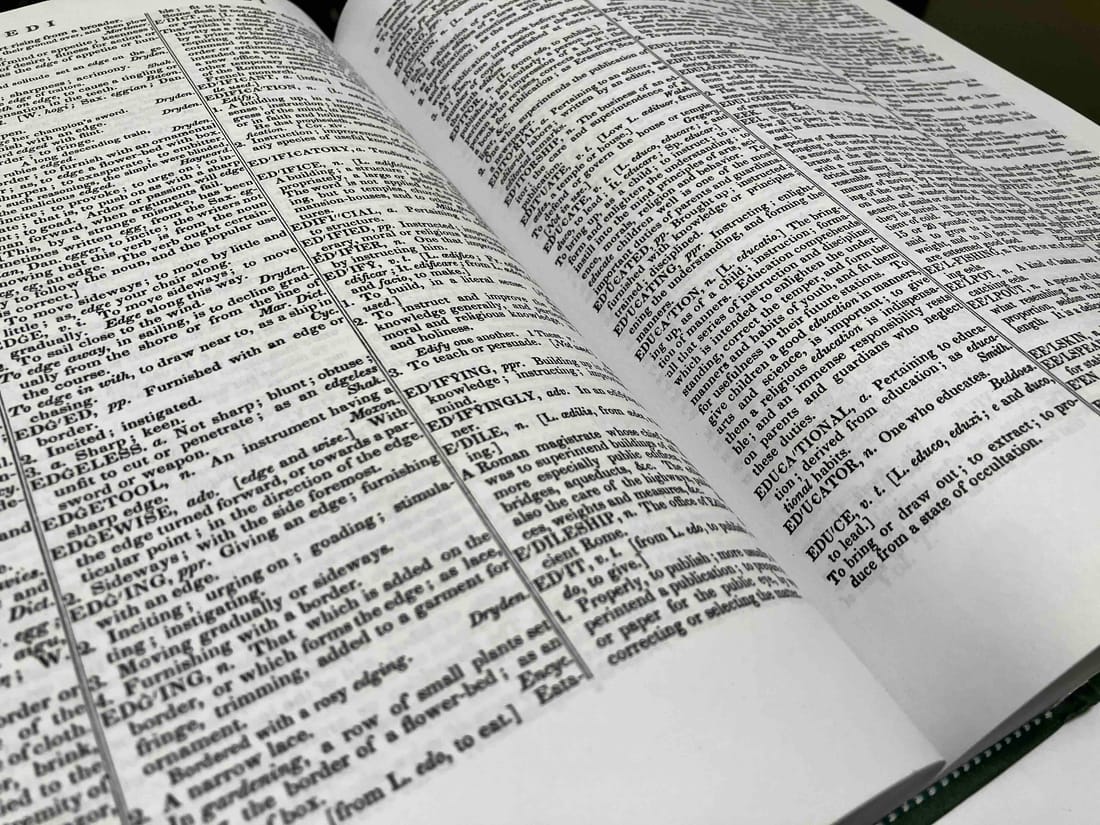Yesterday, one of my students asked me why I reach for a dictionary (specifically, Noah Webster's American Dictionary of the English Language, from 1828) every time one of them asks the meaning of a word, instead of using Google. My response was that while technology can be useful, we should also consult wisdom of ages past, what G.K. Chesterton called the "Democracy of the Dead", because over time the meaning of words change to fit the cultural milieu of the day.
To test this, we did an exercise:
Students, tell me the meaning of the word "education".
Definitions from the class
- Student 1 - to learn.
- Student 2 - learning; etching it into your brain.
- Student 3 - high knowledge.
- Student 4 - to consume knowledge.
- Student 5 - good for brain; helps you understand better. Also brings wonder and awe into your brain.
- Student 6 - When you're done learning something and accomplish (or get) it.
- Student 7 - doing something over and over until you get it right; practice.
- Myself - training the heart and mind to know what you ought and to love what you ought. To train the heart to pursue that which is good, true, and beautiful.
Definitions from dictionaries, and online
- Webster's American Dictionary of the English Language (1828) - The bringing up, as of a child; instruction; formation of manners. Education comprehends all that series of instruction and discipline which is intended to enlighten the understanding, correct the temper, and form the manners and habits of youth, and fit them for usefulness in their future stations. To give children a good education in manners, arts, and science, is important; to give them a religious education is indispensable; and an immense responsibility rests on parents and guardians who neglect these duties.
- Modern Dictionary (2020) - The action or process of educating or of being educated; a stage of such a process; the knowledge and development resulting from an educational process; the field of study that deals mainly with methods of teaching and learning in schools.
- Google
- 1. The process of receiving or giving systematic instruction, especially at a school or university.
- 2. An enlightening experience.
Class Discussion
We compared our class's definitions to the historic and modern definitions, and found that many of the students definitions more closely align with the modern view. We dug into the historic understanding and the meaning of "manners" (politeness), "youth" (young persons), and "stations" (roles in life; e.g. teacher, father, husband, etc). The students gave me these definitions. I never told them, directly, but when they struggled, I did ask questions to guide them in the right direction.
We also observed that while the older definition includes much of what is covered in the newer (I'm thinking of "arts and science" in particular), the new definition leaves out key points from the old (training in manners and habits, correcting the temper, the necessity of religious education, and the duty of parents to provide it). One could say that the new definition also covers "fit[ting] them for usefulness in their future stations," but I would argue that the only station modern education focuses on is that of an employee.
The older definition more closely aligns with the Greek word παιδεία (paideia), which is a key part of classical Christian education. There is no English word that translates it perfectly. Enculturation is close; it involves the forming of the whole person, not just the intellect, and not just for the practical uses of getting a job or making lots of money but for the pursuit of the good, the true and the beautiful (God being the essence and pinnacle of goodness, truth, and beauty).
After posting this, I joined a bi-weekly class I'm taking on Norms & Nobility by David Hicks, and was reminded of a few sentences from the prologue, which we studied a few weeks ago:
Our fascination with technical means, by the very nature of things, subverts the supreme task of education – the cultivation of the human spirit: to teach the young to know what is good, to serve it above self, to reproduce it, and to recognize that in knowledge lies this responsibility. Short of accomplishing this task, the training in our schools must seem purposeless, except in the narrow utilitarian sense of serving "natural religion": that is, the individual's lust for power, sex, and status. Democratic and materialistic society are quite sufficient, without the aid of our schools, for educating the young in the rites of natural religion.
The good school does not just offer what the student or the parent or the state desires, but it says something about what these three ought to desire. A school is fundamentally a normative, not a utilitarian, institution, governed by the wise, not by the many. It judges man as an end, no as a means; it cultivates the human spirit by presenting a complete vision of man as he lives and as he ought to live in all his domains – the individual, the social, and the religious. It teaches the student how to fulfill his obligations to himself, to his fellow man, and to God and His creation.


Member discussion